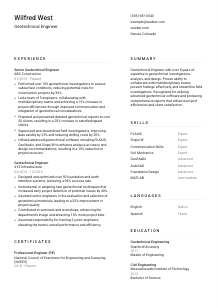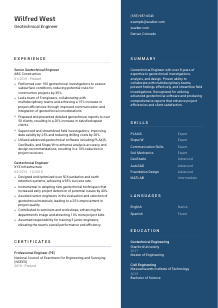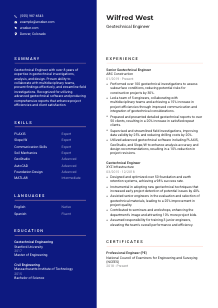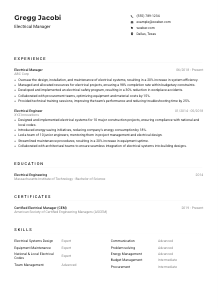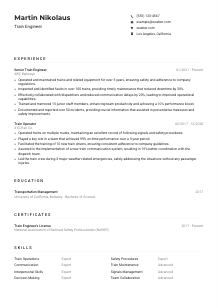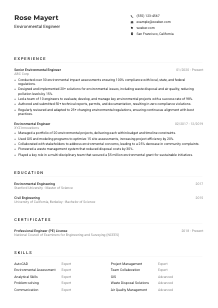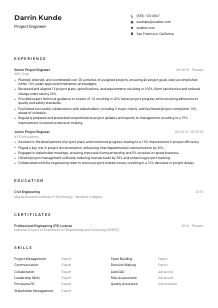Geotechnical Engineer Resume Example
Building foundations, but your resume feels shaky? Drill into this Geotechnical Engineer resume example, structured using Wozber free resume builder. See how you can stabilize your career path with the right materials to meet job expectations, and pave the way for a solid professional future!
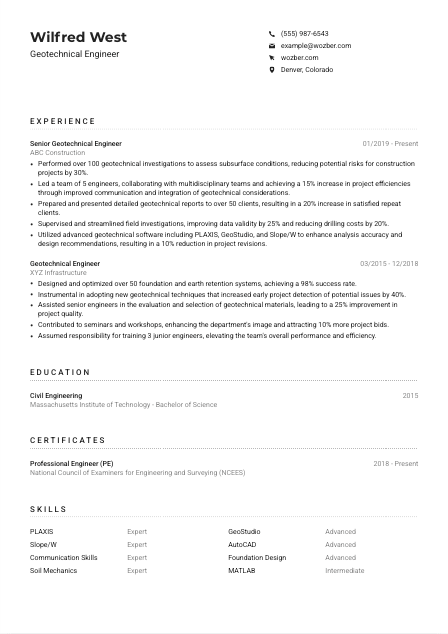
How to write a Geotechnical Engineer Resume?
As you set your sights on the ground beneath our feet, understand that your resume is the very foundation of your career in Geotechnical Engineering. It's not just about listing experiences; it's about showcasing your expertise in analyzing the earth's materials. This article, tailored exclusively for the aspiring Geotechnical Engineer, delves deep into how to craft a resume as solid as bedrock, focusing on specific demands of the position.
Using the Wozber free resume builder, we'll guide you through creating an ATS-compliant resume that not only speaks volumes about your capabilities but also passes through Applicant Tracking Systems (ATS) with ease. Let's lay the first stone.
Personal Details
Your personal details are more than just a formal introduction; they're the seismic waves that make the first impact. Here's how you can ensure they resonate well with employers looking for a Geotechnical Engineer.
1. Stand Out with Your Name
Make sure your name is prominently displayed. Think of it as the peak of a mountain – it should be visible and distinct, setting the tone for the rest of the document.
2. Be Specific with Your Title
‘Geotechnical Engineer' should appear right below your name, echoing the position you're aspiring for. This direct match can significantly enhance your resume's visibility in an ATS scan.
3. Ensure Contact Clarity
List your phone number and a professional email address. It's like giving someone coordinates to a potential mineral deposit – accurate and easy to follow up on.
4. Location Matters
Mentioning Denver, Colorado, not only meets the job's geographic requirement but also signals to the employer that you're ready and in the right place to start.
5. Digital Presence
If you've documented your past projects or contributions to notable geotechnical forums online, include your LinkedIn profile or personal website. It's your digital core sample, showcasing your layers of skills and experience.
Takeaway
Like the stratum of rocks, your personal details layer serves as the foundation of your professional introduction. Ensure it's strong, accurate, and reflects your readiness for the geotechnical engineer role. Let's make it as inviting as a well-prepared site visit.





Experience
In the realm of geotechnical engineering, your experience compacts your resume with undeniable strength. Let's delve into how to layout this cornerstone, making it as impactful as a load-bearing layer.
- Performed over 100 geotechnical investigations to assess subsurface conditions, reducing potential risks for construction projects by 30%.
- Led a team of 5 engineers, collaborating with multidisciplinary teams and achieving a 15% increase in project efficiencies through improved communication and integration of geotechnical considerations.
- Prepared and presented detailed geotechnical reports to over 50 clients, resulting in a 20% increase in satisfied repeat clients.
- Supervised and streamlined field investigations, improving data validity by 25% and reducing drilling costs by 20%.
- Utilized advanced geotechnical software including PLAXIS, GeoStudio, and Slope/W to enhance analysis accuracy and design recommendations, resulting in a 10% reduction in project revisions.
- Designed and optimized over 50 foundation and earth retention systems, achieving a 98% success rate.
- Instrumental in adopting new geotechnical techniques that increased early project detection of potential issues by 40%.
- Assisted senior engineers in the evaluation and selection of geotechnical materials, leading to a 25% improvement in project quality.
- Contributed to seminars and workshops, enhancing the department's image and attracting 10% more project bids.
- Assumed responsibility for training 3 junior engineers, elevating the team's overall performance and efficiency.
1. Decipher the Job
Start by identifying the core responsibilities and technologies listed in the job description. This will form the bedrock of your experience section, ensuring a targeted approach.
2. Solid Structuring
"Utilized advanced geotechnical software including PLAXIS, GeoStudio, and Slope/W," as mentioned in your previous roles, aligns perfectly with the job's technical requirements, showing you speak their language.
3. Highlight Achievements
Quantify your accomplishments like "Performed over 100 geotechnical investigations" or "resulting in a 20% increase in satisfied repeat clients." Numbers are your rocks - solid and unambiguous.
4. Quantify Impact
Your contributions should be as measurable as soil properties. The more specific you are with numbers and outcomes, the clearer your competence becomes.
5. Relevance is Key
Keep your contributions relevant to geotechnical engineering. Unrelated experiences can be seen as filler material, diluting the potency of your professional narrative.
Takeaway
Your experience is the load-bearing wall of your resume. Each project you've worked on adds another layer of credibility and competence. Tailor your experience to reflect the job description, and you'll craft an undeniable argument for why you're the perfect fit.
Education
In geotechnical engineering, your education is like the geological survey that underpins your expertise. Let's explore how to present your academic credentials to align with the bedrock of job requirements.
1. Identify Key Qualifications
The job description asks for a "Bachelor's degree in Civil Engineering, Geotechnical Engineering, or a related field." Make sure your educational background matches this fundamental requirement.
2. Structure Clearly
Present your degrees starting from the most recent. For instance, listing your Master's before your Bachelor's draws attention to your higher qualification level right away.
3. Degree Specification
"Bachelor of Science in Civil Engineering and Master of Engineering in Geotechnical Engineering" closely aligns with the job's educational requirements, showcasing you have the exact groundwork they're looking for.
4. Relevant Coursework
Though your degrees cover the bases, mentioning any special coursework or thesis related to the specifics of geotechnical engineering can add valuable layers to your profile.
5. Additional Achievements
If you've been recognized for your academic or project work, such as a notable paper on soil analysis, include these accomplishments. They're the gems in your educational strata.
Takeaway
Think of your education section as the geological survey of your resume: it provides essential information on the material present (you!). Each element should highlight your preparation and suitability for a role in geotechnical engineering.
Certificates
In the world of geotechnical engineering, certificates are like borehole samples – they provide evidence of the depth and quality of your expertise. Let's drill into how to display these precious credentials.
1. Extract Key Requirements
Spotlight any certificates that meet explicit job requirements, such as the "Professional Engineer (PE) licensure." This directly matches one of the essential qualifications mentioned in the job ad.
2. Quality Over Quantity
It's better to list a few highly relevant certifications than a long list of only tangentially related ones. Think of it as presenting core samples that best represent the site – in this case, your expertise.
3. Date Transparency
If a certificate has an expiration date or was recently obtained, include this info. It shows continuous development in your field, much like the ongoing assessment of a geotechnical site.
4. Stay Current
The earth is always shifting, and so is the field of geotechnical engineering. Keep your certificates up-to-date and pursue ongoing education to remain at the forefront of your field.
Takeaway
Your certifications are more than just accolades; they are proof of your commitment and expertise within the geotechnical community. Display them prominently to show you have both the depth and the quality sought after in this rigorous field.
Skills
The skills section of your resume is like your geotechnical engineer's toolkit. Here's how to ensure it's well-equipped with every instrument you'll need to stand out in this field.
1. Unearth Key Skills
Dig deep into the job description to identify both the hard and soft skills required. Tools like PLAXIS, GeoStudio, and Slope/W are your excavators and soil testers in this metaphorical toolbox.
2. Tool Selection
Focus on skills that directly align with job necessities. Your adeptness in "Communication Skills" and software proficiency in "PLAXIS" and "GeoStudio" are precisely the tools needed for the job at hand.
3. Organize Neatly
A cluttered toolbox is of little use to anyone. Organize your skills in a clear, easy-to-scan manner, grouping similar tools together to show you're prepared for any job scenario.
Takeaway
Your skills section is a professional showcase of your most relevant tools and abilities. Remember, it's not about having the most tools; it's about having the right ones for the job. Keep them sharp, accessible, and ready to employ.
Languages
In the global field of geotechnical engineering, being multilingual can be as valuable as understanding diverse geological formations. Here's how to depict your linguistic range effectively.
1. Job Language Prerequisites
Ensure you meet any specific language requirements stated in the job posting. For instance, "Fluent English is a requirement" signals that your resume should affirm this proficiency upfront.
2. Lead with Necessary Tongues
If English is required, list it first and clearly state your fluent proficiency. It's akin to laying the bedrock with the primary language needed for the role.
3. Showcase Your Linguistic Portfolio
Other languages you speak can enhance your resume, much like additional skills in a toolbox. They demonstrate versatility and the ability to navigate diverse cultural terrains.
4. Honesty in Proficiency
Clearly define your level of fluency for each language. Misrepresenting your language skills is like misinterpreting soil data – it leads to unstable foundations.
5. Understand the Geotechnical Scope
While the focus is on English for this role, acknowledging your additional languages shows a preparedness for projects that may have an international scope or involve teams from different linguistic backgrounds.
Takeaway
Your language skills are the cultural substrata of your resume, enriching your professional profile. As a geotechnical engineer, being able to communicate effectively in multiple languages can be as critical as accurately interpreting geotechnical data.
Summary
Your summary is the compacted layer of everything you are as a professional. Here's how to make sure it's as sturdy and impressive as a well-laid foundation.
1. Core Analysis
Start by identifying the essence of what makes you an outstanding Geotechnical Engineer. Reflect on your experience with "geotechnical investigations, analysis, and design."
2. Solid Introduction
Introduce yourself with a strong statement that encapsulates your experience and expertise, such as being a "Geotechnical Engineer with over 8 years of expertise."
3. Reinforce with Achievements
Embed your key achievements and skills within your summary. Mentioning your successful projects and proficiency in software like PLAXIS and GeoStudio demonstrates your solid base of experience.
4. Conciseness
Keep your summary concise; it's the layer of topsoil that entices someone to dig deeper into your resume. Three to five lines are sufficient to encapsulate your professional stature.
Takeaway
Think of your summary as the bedrock of your resume, providing a stable base that supports everything above it. It's your chance to make a strong first impression, drawing the reader in to explore the depths of your professional experience and expertise.
Embarking on Your Geotechnical Engineering Journey
With these tools and tips at your disposal, you're ready to craft a resume as formidable as the earthworks projects you aspire to lead. Utilize the Wozber free resume builder to bring these guidelines to life. It offers an ATS-friendly resume template and an ATS resume scanner, ensuring your application is not only impactful but also ATS-compliant.
Your geotechnical engineering career is a landscape of potential — let your resume be the map that guides you to its most rewarding terrains. Dig deep, design well, and embark on your next professional adventure with confidence.

- Bachelor's degree in Civil Engineering, Geotechnical Engineering, or a related field.
- Minimum of 5 years of experience in geotechnical investigations, analysis, and design.
- Proficient in using geotechnical software such as PLAXIS, GeoStudio, and Slope/W.
- Strong interpersonal and communication skills to collaborate with multidisciplinary teams and present findings to clients.
- Professional Engineer (PE) licensure or ability to obtain within 1 year.
- Fluent English is a requirement for this position.
- Must be located in or willing to relocate to Denver, Colorado.
- Conduct geotechnical investigations to assess subsurface conditions and potential risks for construction projects.
- Perform geotechnical analysis, stability calculations, and design recommendations for foundations, slopes, and earth retention systems.
- Collaborate with project teams, including architects and structural engineers, to ensure geotechnical considerations are integrated into designs.
- Prepare and present geotechnical reports, findings, and recommendations to clients.
- Supervise field investigations, including drilling, sampling, and in-situ testing, to gather data for analysis.





